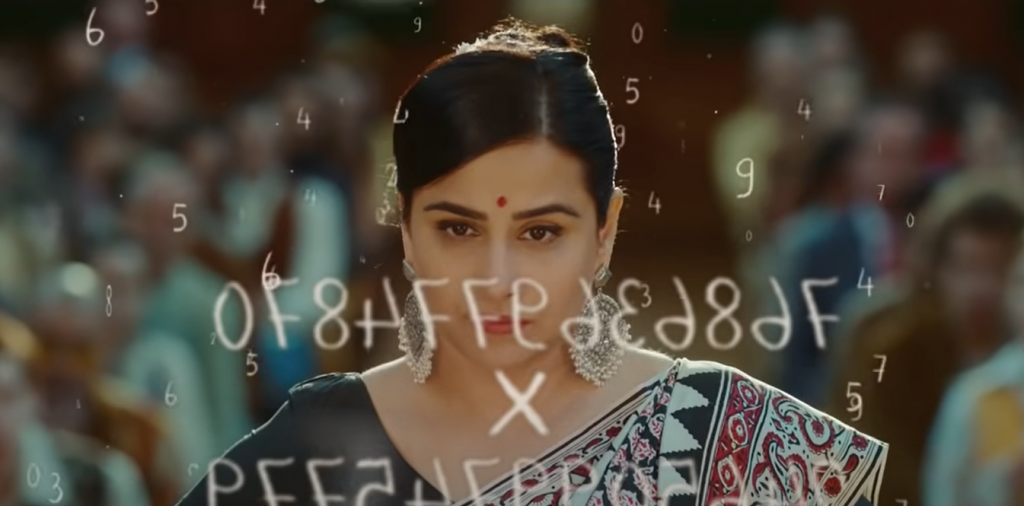Genius, mental calculator, author, astrologer, one-time political hopeful who ran for elections against Indira Gandhi — of all the things Shakuntala Devi was and has been called, the one that’s most interesting is Human Computer. Because while it’s often said that a computer can never be wrong (although there is a scene in the movie in which she proves it can be), Shakuntala is human. And that means she, like all of us, is often wrong.
It is this human, flawed aspect of her that director Anu Menon brings out in Shakuntala Devi, out now on Amazon Prime Video. Menon and her co-writer Nayanika Mahtani had extensive meetings with the real Shakuntala’s daughter, Anupama Banerji, and the story is told from her perspective. And this is no ordinary mother-daughter relationship — it’s fraught with resentment, pain and rage.
The movie begins in London in 2001, where Anupama (played by Sanya Malhotra) has filed a criminal case against her mother, Shakuntala Devi (played by Vidya Balan), for trying to destroy her financially. The scene then shifts to Bangalore of 1934, where a five-year-old Shakuntala gets to the cube root of an eight-digit number within seconds. When it becomes clear that this is no fluke, her circus lion-tamer father takes her to various local schools — not for admission, but to make money off her ‘math shows’, where people throw challenges at her and she solves them.
She wants to go to school for real, but money is tight. When tragedy strikes, little Shakuntala vows she will become a ‘badi aurat’ and will never forgive or be like her mother, who she thinks is weak. She works so hard to not be like her mother that decades later, her own daughter will swear she never wants kids because she is so afraid of being a mother like Shakuntala.
This is a far cry from the nurturing maternal instinct that mothers in Hindi movies are usually shown to have. Unfortunately, that freshness is undone by a weak script, forced and simplistic feminism and a slightly OTT (pun intended) Vidya Balan.
The movie swings between 1934 and the 2000s, with detours, in no particular order, to 1978, 1954, 1998, 1970 and so on. The non-linear timeline is jarring and gives you little time to settle into a scene before it jumps to another.
Also, too much time is spent showing Shakuntala at math shows to drive home just how much of a genius she is, without ever having gone to school. By the dozenth mental calculation she has correctly performed, you feel like you’re back in a high school math class — it’s the same kind of headache.
These scenes also come at the cost of other aspects of her life, such as how she managed to get away from Bangalore and move to London on her own and how her relationship with her parents soured even further. And the last 20 minutes are painfully melodramatic, undercutting all the earlier refreshing novelty.
There are some lovely scenes, like when Shakuntala moves into a guest house in London and tells the men who stay there that she shot a man’s ear off, and her relationship with Javier, who mentors her — but they just don’t come together.
Motherhood versus math, and some forced feminism
What the film does brilliantly, though, is show Shakuntala with all her warts. This is no hagiography, as Bollywood biopics tend to be (think Sanju or MS Dhoni). Vidya Balan’s Shakuntala is brutally selfish and self-absorbed to the point of near-delusion.
It’s surprising, for example, that someone who resented her own parents not sending her to school doesn’t send her own daughter to school either, preferring to take her along on her math show tours because she doesn’t want to be without her.
When her husband, Paritosh (a wonderfully understated Jisshu Sengupta), says he can’t give up his life to tag along to her math shows and their child deserves a stable home, she turns it into a feminist issue, saying the world would expect her to follow him if the roles were reversed. True, but he has never had these expectations, so to turn the tables on him purely to make that point seems unnecessary.
The film has a lot of these moments that feel inauthentic, planted solely to drive home a feminist message. This would be great if there was some nuance to it, but here the feminism is more like Shakuntala’s excuse to get her way. However, while the endless messaging is tiring, what these scenes do achieve is the idea that this is not your typical Hindi film heroine whom you root for all the time. Because she’s a heroine who’s often deeply unlikeable and that, in itself, is an achievement.

